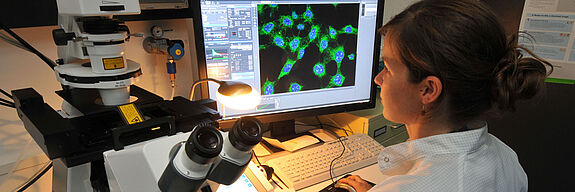Areas of investigation/research focus
The research group "Advanced Cellular Models of Neurodegeneration" focuses on the development of cutting-edge cellular models for the study of monogenetic neurodegenerative diseases. Dr. Hauser leads a team dedicated to advancing our understanding of neurodegenerative diseases and identifying novel treatment strategies.
Our primary research objectives include:
- Development of iPSC-based disease models: We have generated over 100 induced pluripotent stem cell (iPSC) lines from patients with rare monogenetic neurological disorders. These iPSCs serve as tools for disease modeling, allowing the identification of pathophysiologically relevant cellular phenotypes and contributing to the development of therapeutic strategies.
- Preclinical treatment strategies for neurodegenerative diseases: Our group has developed innovative preclinical treatment options for monogenetic neurological disorders. This work has led to significant advances in innovative treatment strategies, such as allele-specific targeting strategies using antisense oligonucleotides (ASOs) for diseases like spinocerebellar ataxia type 3 (SCA3) as well as mRNA- or AAV-based approaches for hereditary spastic paraplegia (HSP).
- Biomarker discovery for neurodegenerative diseases: Our group is actively involved in the discovery and validation of reliable biomarkers for the assessment of pathophysiological processes and therapeutic interventions in slowly progressive neurodegenerative diseases. Our focus includes the identification of metabolic biomarkers using iPSC-derived neural models.
Looking forward, our future research directions include:
- Development of antisense oligonucleotide (ASO)-based strategies: We aim to optimize and standardize workflows for identifying and validating ASOs in iPSC-derived models. This includes extending ASO approaches to other toxic gain-of-function neurodegenerative diseases.
- Investigate preclinical treatment strategies for HSP and motor neuron disorders: With a focus on hereditary spastic paraplegia (HSP), we aim to identify common disease signatures across HSP subtypes and other motor neuron diseases by focusing on axonal phenotypes.
- Development of advanced cell culture models: Our team is dedicated to developing robust protocols for generating disease-relevant cell types in advanced cell culture systems. This includes the use of microfluidic systems, co-culture studies, and brain organoids to more closely mimic the physiological environment.

